|

August
2025: The Lost Cure is featured in Adventure
magazine’s 30 January 1923 issue but has never
before been published in book form. As always,
Beadle’s work resonates with potent
authenticity, because it’s deeply grounded in
actual experience. A courageous explorer and
innovative writer, he spent a dozen years in
Africa between 1898 and 1910, building a
treasure trove of memories and observations
that would later nourish his stories, essays,
and novels.
Upon
expatriating to France, he was soon
befriending budding visionaries such as
Picasso, Max Jacob, and Modigliani, who
sketched Beadle circa 1915. After traveling
throughout the U.S. during the war years, in
1919 he returned to Place de Tertre in
Montmartre, which was still a vibrant cultural
focal point, and which would inspire the
setting of Beadle’s greatest novel. Thanks to
Jack Kahane, the legendary founder of Obelisk
Press, Beadle’s banned masterpiece, Dark
Refuge, was published in Paris in 1938. In
1941 Faber and Faber published Artist Quarter,
a nonfiction work pseudonymously coauthored by
Beadle with Douglas Goldring – considered to
be the urtext of Modigliani biography.
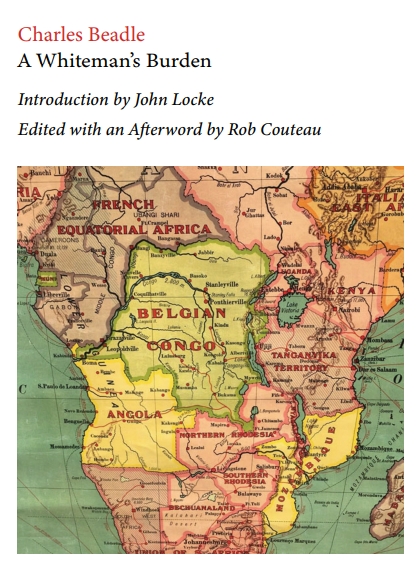
Purchase
Info
Few works of
literature deal with the sleeping sickness
epidemic that killed hundreds of thousands
of Africans at the turn of the century.
One notable exception is Charles Beadle’s
A Whiteman’s Burden, published in
1912, when African trypanosomiasis was
still claiming lives in Uganda and the
Congo: sites of his numerous expeditions.
Beadle traveled through the most infected
areas in the early 1900s – at the very
peak of the catastrophe – when Uganda lost
a quarter of a million inhabitants and the
number of infected Congolese had reached
several hundred thousand. His presence in
Africa between 1898 and 1910 lends us a
rare personal insight into this larger
collective crisis.
With
its abundant depictions of absurdity,
alienation, and isolation as the
characters confront the dreadful
vicissitudes of life and the indifference
of the glittering cosmos swirling above
the vast African firmament, we’re left to
wonder: Is A Whiteman’s Burden
one of Europe’s first existential novels?
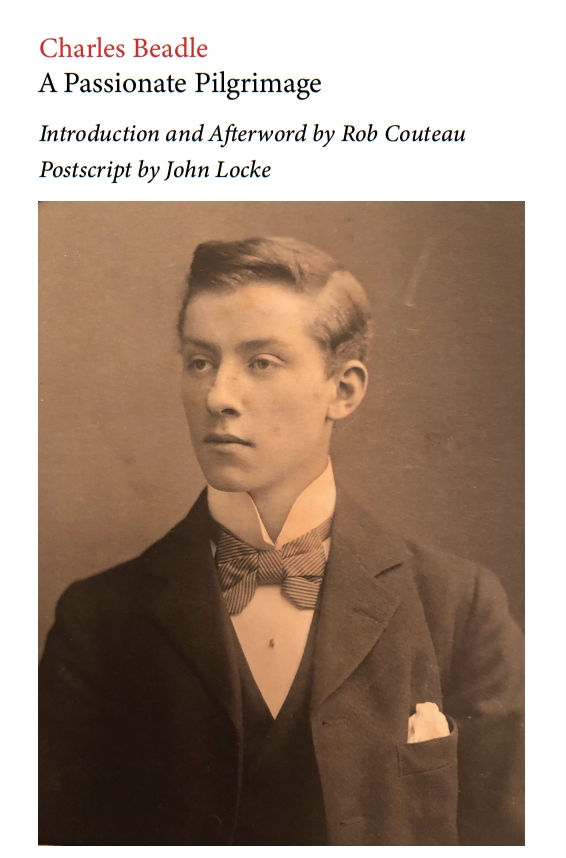
Purchase
Info
In
1915, Charles Beadle authored a banned
literary novel, A Passionate
Pilgrimage: one of ten books
blacklisted between 1914 and 1916 by
Britain’s Circulating Libraries
Association. Drawing from personal
experience, the author affords us a
glimpse into the underbelly of Victorian
society, breaking through the “mind-forg’d
manacles” of what was then considered as a
“tasteful” tale and exploring points of
view that only an anti-Victorian story
might dare encompass. With the publication
of Dark Refuge (1938), he
produced an even more provocative
chronicle – one that was also banned in
the Anglo-Saxon world due to its brazen
portrayal of the Parisian demimonde. Both
these censored books portray the shifting
mores of the times and encompass a major
trajectory in the author’s life. Back in
print for the first time since 1915, this
newly revised edition features over 200
annotations, an in-depth Introduction and
Afterward, a Postscript by John Locke, and
a transcript of Beadle's previously
unpublished letters to his niece Isabel.
It also includes a reproduction of a newly
uncovered portrait of Beadle by the artist
Amedeo Modigliani.
"A
Passionate Pilgrimage was first
published in 1915, when it earned the
acclaim of being one of ten books
blacklisted for years by Britain’s
Circulating Libraries Association. Modern
readers may be puzzled by this fact when
they read this novel; but its descriptions
of free-ranging sensual encounters between
the protagonist and a host of consenting
women made it a scandalous piece at the
turn of the century. Why reissue A
Passionate Pilgrimage now? The
introductory notes (which are extensive
and vital to understanding the novel’s
continuing importance) state that the
novel: 'provides a variety of clues about
Beadle’s early life.' In so doing, it
reveals the essence of social and
psychological transformation, toeing the
line between autobiography and a fictional
discourse containing many topics vital to
understanding not just these times, but
modern morals and values. Its subjects and
considerations make for thoroughly
engrossing reading, presented in a way
that builds the character’s focus,
emphasizes his differences, and ultimately
creates a captivating tale of
transformation and insight. Libraries that
choose A Passionate Pilgrimage
will find it highly recommendable to
students of literature; teachers seeking
novels that hold lively debates about not
just banned literature, but banned ideas;
and book clubs that will find A
Passionate Pilgrimage thoroughly
thought-provoking.”
- Diane Donovan, Senior editor, Midwest
Book Review
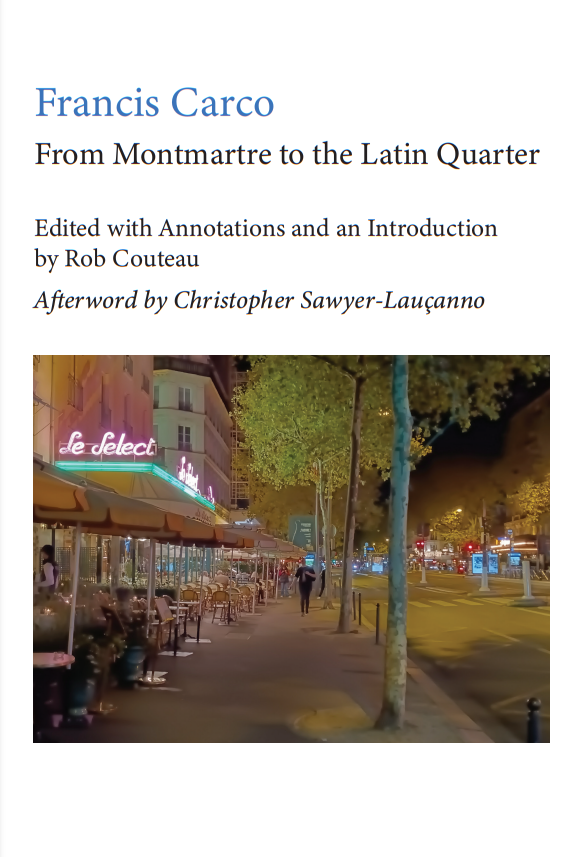
PURCHASE
INFO: Amazon
/ Bookfinder
"If,
perchance, From Montmartre to the
Latin Quarter sounds familiar,
that's because Francis Carco's memoir
was first published in 1927. This
annotated edition makes his work more
accessible to a wider audience, includes
Rob Couteau's analytical Introduction
and a new Afterword by Christopher
Sawyer-Laucanno, and follows the
experiences of an 1886 poet, artist, and
traveler who fell into a close,
supportive association with bohemian
Paris. There the young man creatively
blossomed, immersed in the arts and
producing over a hundred books that
ranged from poetry to his own astute
analyses of other artists, including a
critical essay on Modigliani which
revealed the man's value at a point
where other French critics scoffed at
his works.
From Montmartre to the Latin Quarter
is more than your typical biography. It
assumes the atmospheric draw of a Proust
production with its 'you are here'
survey of Paris' artistic community.
Couteau's footnotes add critical
reflections and interpretations key to
understanding Carco's objectives and
perspectives. Both Carco and researcher
Rob Couteau create compelling
observations, insights, and historical
value, but couch these in lively
language and passages that should reach
into general-interest audiences who hold
an appreciation for all things Parisian
and for its arts community of the early
1900s. Its survey of friendships,
relationships, and the artistic promise
quashed by events of the Great War
create a lively, memorable read
especially recommended for those who
appreciate in-depth footnoted
references. These enlighten readers on
facets of Carco's life that might
otherwise slip by with a reading of the
memoir alone.
All
these facets make From Montmartre
to the Latin Quarter an astute
historical and literary memoir that
embraces the arts, social and political
milieu, and powerful perspectives of the
times. Libraries (including
general-interest collections as well as
college-level holdings strong in memoirs
and artist history) will find it easy to
recommend From Montmartre to the Latin
Quarter for its thoroughly engrossing,
richly realistic passages, firmly
embedded in Carco's life and the
creations and influences of 1900s
Paris."
- Diane Donovan, Senior editor, Midwest
Book Review
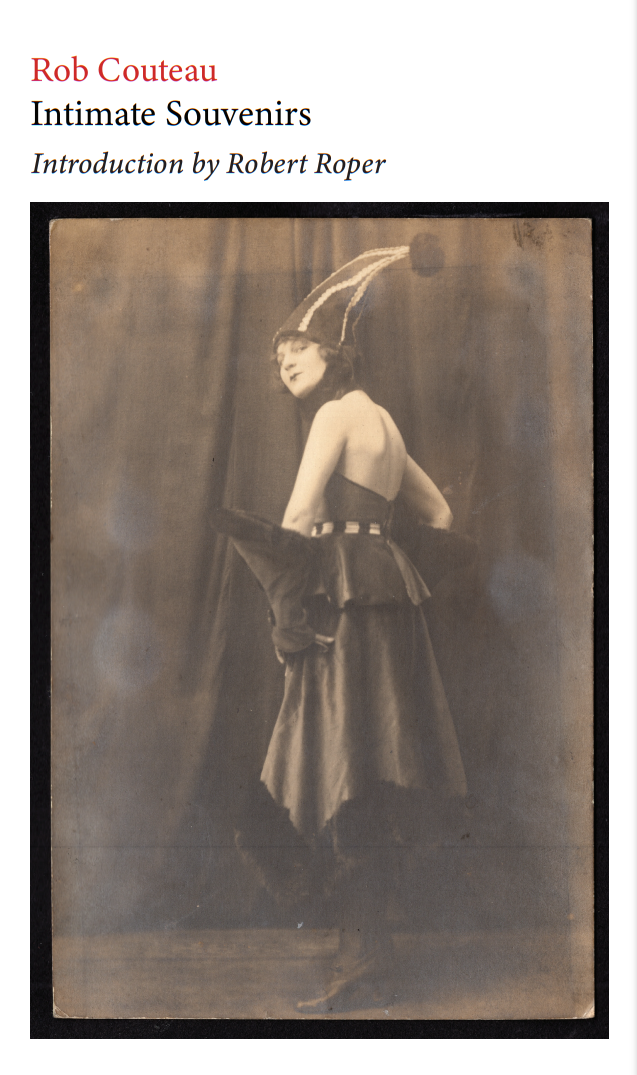
PURCHASE
INFO
"Here
we have a new, possibly classic memoir
of New York. It begins in Gravesend,
Brooklyn, and moves outward, to
Manhattan and Paris ... That there still
exists a path to a writer's life that is
not a dutiful march through creative
writing academies, with perhaps the
apotheosis of becoming a teacher of yet
more academy-shaped writers, is
heartening to learn. Couteau does not
make fun of that approach nor of any
other, but he does model something much
different, and to see him continuing to
write books like this one, which well
deserves a place on his already
considerable shelf of valued books, is
excellent news."
- Robert Roper, author of Nabokov
in America: On the Road to Lolita
and Now the Drum of War: Walt
Whitman and His Brothers in the Civil
War.
"As
Couteau moves through different worlds
(including France), encountering
literary, artistic, and social figures,
he finds a new sense of home, place, and
purpose which translates to social and
philosophical revelations about life,
religion, and the world. Ultimately, his
very method of engaging with other
worlds is what links readers to his life
and the exuberant march of its
encounters and revelations.... Five
hundred pages go by in the blink of an
eye as readers absorb an intriguing
memoir that deserves a place in any
library strong in memoirs that embrace
literary, artistic, and social
transformation."
- Diane
Donovan, Senior Editor, Midwest
Book Review.
We're
proud to announce the publication
of Stanley Marks' visionary play,
A Murder Most Foul! A
Three-Act Play About the JFK
Assassination. Introduction
by Rob Couteau. Afterword by James
DiEugenio.
On
February 19, 1968, author Stanley
Marks copyrighted his first play,
a visionary attempt to penetrate
the Deep Politics matrix of the
JFK assassination. Among other
things, the play predicts the
assassination of Bobby Kennedy,
which occurred only 3 1/2 months
later; as well as the eventual
presidential election of Ronald
Reagan. This manuscript sat in a
Library of Congress box collecting
dust until 13 April 2023, when it
was published in book form for the
very first time.
"Attorney
Stanley Marks was one of the very
few people in America who read
both the 888 page Warren
Commission Report and the
accompanying 26 volumes of
testimony and exhibits. Out of
that mountain of material, his
book features 975 questions for
the prosecution. In a relentless
and blistering manner, he showed
why the case against Oswald should
not go to trial. In other words,
he stopped the Commission right
out of the starting gate.... I
could go on and on about the
critical acuity and
comprehensiveness of Stanley
Marks' work and how it differs in
kind from that of other
first-generation critics.... What
is so remarkable about Stanley is
that his analytical efforts were
not enough for the man. He
attempted to bring this heinous
crime to the attention of the
public through his efforts as a
playwright. And, thanks to
Couteau, we now have his play
about the assassination of
President Kennedy."
-
Scholar and historian James
DiEugenio, the world's leading
authority on the JFK case, author
of Destiny
Betrayed: JFK,
Cuba, and the
Garrison Case
and The JFK Assassination,
and screenwriter of Oliver Stone's
documentary, JFK Revisited.
PURCHASE
INFO
From
the Postscript by Christopher
Sawyer-Lauçanno:
"Beadle is the real deal. And Rob
Couteau is the real deal too.
Without his desire to rescue Dark
Refuge from oblivion, we
would all have missed out on a
tremendous modernist novel that
should rank among other classics
such as Tropic of Cancer,
Nightwood, Nadja, Ulysses, To
the Lighthouse, and, of
course, Naked Lunch. And
thanks to his extensive
annotations and deep research, we
have both the novel and the
context that created it. I am
admiring and grateful."
Diane
Donovan, Senior Editor, Midwest
Book Review:
"Dark
Refuge appears in
print for the first time since its
original publication in 1938,
presenting a world traveler’s
experiences with bohemian life in
Paris in a novel that also serves
(thanks to Rob Couteau) as a
biography of Beadle’s life.
Extensive
annotated references link Beadle’s
experiences to his fictional
representations, offering a
literary backdrop for
understanding both the atmosphere
and progression of his fiction and
its roots in reality.
Readers
should be prepared for a sexual
romp that is ribald, explicit, and
thoroughly steeped in Beadle’s
personal experiences of the times.
Beadle’s language is evocative,
poetic, and dramatic: ‘I simply
slip through the other room of the
café and out into the other
boulevard, laughing to twist my
guts. Nobody knows that I have a
rendezvous. The coat and hat annoy
me. How silly! I throw them away
as I run, for I know it is late
and I’m frightened that my beloved
will not wait. God is crying
harder than ever, and I suck in
his tears. How funny it must be to
weep!’
Whether
exploring drug experiments and the
revelations that follow them or
descending into the sordid and
colorful world of bohemian Paris,
Beadle flavors all of his
impressions with the same
attention to flowery detail that
makes his writing so time-less:
‘Inexorably I was borne along up
this staircase of Time as an
express lift passes floors,
glimpsing worlds where the highest
form of life was apes chattering
futilely in leagues of simian
nations of their own; where vast
beasts resembling tanks plunged
through swamp and over prairie;
where the sky was of steam and
gas, and volcanoes burst like
firecrackers on a Chinese New Year
amid a seething sea; and on and on
until there were no more worlds
and naught seemingly but
incandescent void.’
Pair
this with the extensive notes and
annotated references Couteau
injects to not just explain but
expand the story, for a sense of
the unique literary and historical
importance of this reappearance of
Beadle’s rare classic, which has
been out of print for far too
long.
Libraries
seeking literary representations
of the marriage between fiction
and nonfiction will find Dark
Refuge a fine example. The
200+ annotated notes come from
previously unpublished letters and
documents, combining with photos
and historical reviews to
represent a hallmark of not only
literary fiction, but biographical
research.
Dark
Refuge deserves a place in
any library strong in works of
literature that represent the
intersection between fictional
devices and biographical
inspection, whether or not there
is prior knowledge of or interest
in Beadle’s works and importance."
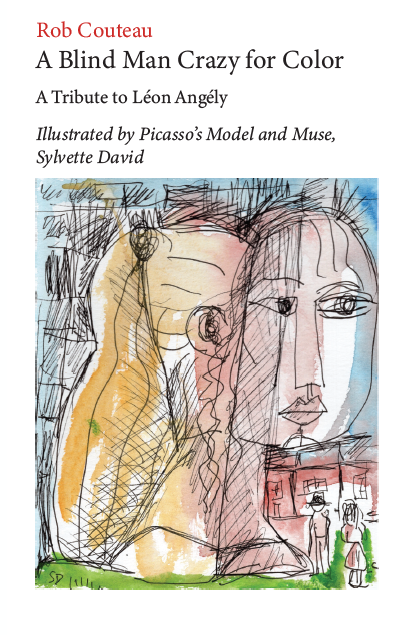
PURCHASE
INFO
Book
review by Scott
Sublett, New Art
Examiner:
"A Blind Man Crazy for Color:
A Strange Tale from the Annals
of Art Collecting":
In
Paris of the 1910s, when
hungry artists would take
almost any pittance for their
work, an old man of extremely
limited means scooped up
Picassos, Modiglianis,
Utrillos, Matisses and
Cezannes, each painting bought
for the price of a couple of
good restaurant meals. The
prescient old man’s collection
would, today, be worth
hundreds of millions, if not
billions, and one might say
the old man had a superlative
eye, were he not blind.
In
his strange, fascinating new
book, A Blind Man Crazy
for Color,
writer-painter Rob Couteau
assembles and unearths what
little can be known about the
mysterious collector Léon
Angély, a bald, fat, retired
solicitor’s clerk who gambled
what small money he had on the
dream of assembling a
collection that could someday
finance a luxurious retirement
in Nice.
When
Père Angély started
collecting, he was already
myopic but could still see.
Over a period of about 20
years, though, his vision
disappeared. “I have only one
fan, and he’s blind,”
Modigliani is quoted as
saying. (In the book’s
footnotes there’s another
lovely Modigliani quotation:
“I do at least three paintings
a day in my head. What’s the
use of spoiling canvas when
nobody will buy?”) Rather than
let blindness end his Sunday
afternoon visits to studios,
Angély continued collecting
with the help of a poor,
unschooled young girl, on
whose shoulder his hand rested
as they made their way through
Montmartre. Little Joséphine
would describe the paintings,
and on the basis of her simple
descriptions, he would choose.
Figures as distinctive as Léon
and Joséphine were certainly
noticed. Couteau quotes John
Richardson’s A Life of Picasso
as asserting that the painter
was fascinated by the old,
blind collector, and
Richardson goes on to
speculate, quite plausibly,
“Picasso may have drawn on his
memory of the sightless art
lover and his child guide when
in 1934 he depicted a blind
Minotaur being led around by a
little girl.” It’s likely Léon
and Joséphine were beloved
Montmartre characters, despite
the old man’s tightness with a
franc. Adding another layer of
resonance to Couteau’s slim
volume are the charming
illustrations by Lydia
Corbett, also known as
Sylvette David, the
pony-tailed model and muse who
inspired Picasso’s Sylvette
Period (and whose hairstyle
was copied by Bridgette
Bardot). Now 87 and living in
Devon, Sylvette had a show
seven years ago at London’s
Francis Kyle Gallery. It may
seem tragic that Angély died
in 1921, before the artists he
discovered skyrocketed in
value. To keep body and soul
together in inflation-racked
post-World War I Paris, he
disposed of his collection for
little more than he had paid.
Still, for decades he had the
aesthetic thrill of some of
art history’s greatest
accomplishments covering his
shabby garret walls, and for
some of that time, he could
see them.
Diane
Donovan, Senior Editor,
Midwest Book Review:
A
Blind Man Crazy for
Color: A Tribute to
Léon Angély
documents an early 20th
century retired clerk
who collected art by
Picasso, Modigliani, and
Utrillo before these
artists were famous.
Despite his failing
vision, Léon Angély
could see the promise of
these artists before
those around him
acknowledged their
talents. He employed a
young girl to help him
make his selections when
his sight no longer
permitted him to
personally enjoy them.
The
book is illustrated with
original artwork by Picasso's
model and muse, Sylvette
David, who posed for the
painter in 1954 when she was
only nineteen years old. Her
black and white and color
sketches accent this colorful
portrait of Léon's life,
motivations, involvement in
the art world, and the pieces
he collected. Previously
unpublished information about
the blind man's passion and
his influence on the art world
enhances a survey that should
be required reading and
acquisition for any serious
art history student and the
libraries catering to them.
The
well-researched treatise is
supported by documentation
that ranges from birth and
death certificates to Rob
Couteau's personal
research into Sylvette David
who, at eighty-seven, adds her
memories to the story to
expand reader insights about
both Picasso and David's life
and their art involvements.
Readers
also receive revealing
inspections of the process of
interviewing artists and
capturing their historical and
artistic impact, adding to A
Blind Man Crazy for Color's
importance as a survey that
goes beyond a singular
biography of an art enthusiast
to delve into the world of
artists, art appreciation, and
muses. The blend of all these
elements demonstrates the
interlinked potentials and
importance of artists, muses,
and those who appreciate,
purchase, and analyze their
work:
"Although
he died impoverished and
nearly forgotten, and although
the identity of his youthful
guide is still enshrouded in
mystery, le Père Angély helped
to preserve what Richardson
calls the “sacred stuff of
art” – regardless of whether
his motivation was merely
pecuniary. Léon and Joséphine
may also have inspired the
greatest artist of the
twentieth century."
Serious
art libraries should consider
this extraordinary recreation
of artistic ambitions against
all odds a mainstay that
stands out in many different
ways.
Available
for the first time since
February 1970: Stanley J. Marks'
Coup d'Etat, with an
Introduction by Rob Couteau.
"A
good book by a keen and
knowledgeable attorney. Rob
Couteau has done a service by
bringing these books back. Marks
was a buried gem."
-
James DiEugenio, the foremost
scholar of the JFK assassination
and author of Destiny
Betrayed: JFK, Cuba, and the
Garrison Case. DiEugenio
is also the screenwriter of
Oliver Stone's documentary, JFK
Revisited: Through the Looking
Glass (2021).
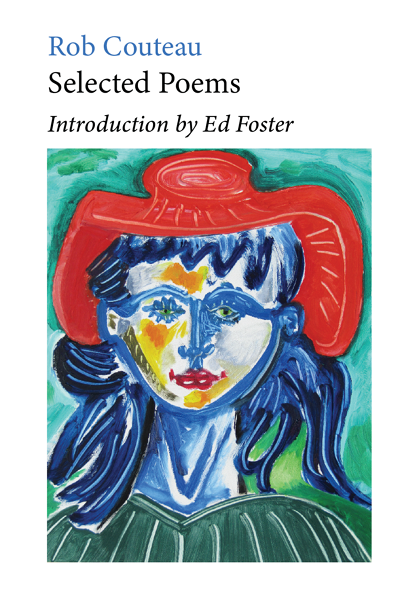
Diane
Donovan,
Senior editor,
Midwest Book
Review:
"SELECTED
POEMS features 101 poems, 40 of
which have been printed in
numerous print and online
journals since 1985. The rest
are new to this collection, and
represent a satisfying blend of
old and new works designed to
appeal to newcomers and prior
fans alike. Rob Couteau's works
are diverse. They follow no set
poetic structure, even defying
some of them when the muse
strikes and special needs
indicate that the subject is
more important than poetic
form.... His inspections of
artistic, literary, and social
issues are astute and
compelling.... Don't anticipate
set structures, uniform poetic
approaches, or singular subjects
here. SELECTED POEMS offers a
freewheeling approach to poems
and life alike, and is a thought
provoking, evocative gathering
of works recommended for
literary readers not bound by
convention or rules." With an
Introduction by the poet,
critic, and literary historian
Edward Foster.
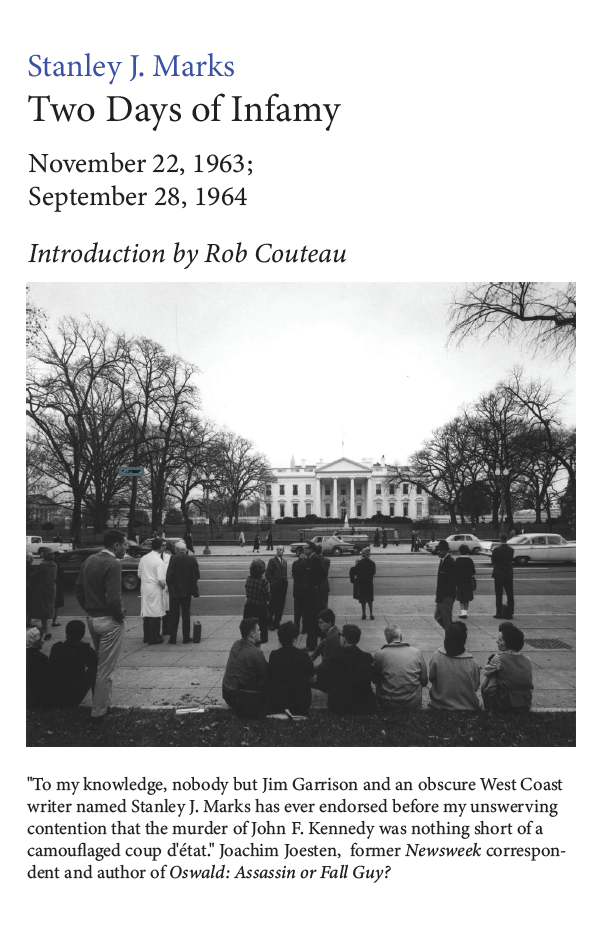
"Rob
Couteau has performed a
miraculous deed. He has gotten
two of the late Stanley Marks'
books on the JFK case
republished. Marks was way ahead
of the field. While people like
Harold Weisberg and Josiah
Thompson were still counting
bullets, he was calling JFK's
death a coup d'etat. That is the
perspective he wrote from way
back in the late Sixties. Don't
pass up the chance to meet up
with a prophet. Read both of
these books. You will be shocked
by the insight in them."
-
James DiEugenio, JFK scholar and
author of Destiny Betrayed,
commenting on Murder Most
Foul! and Two Days
of Infamy. DiEugenio is
also the screenwriter of Oliver
Stone's 2021 documentary, JFK
Revisited: Through the Looking
Glass.
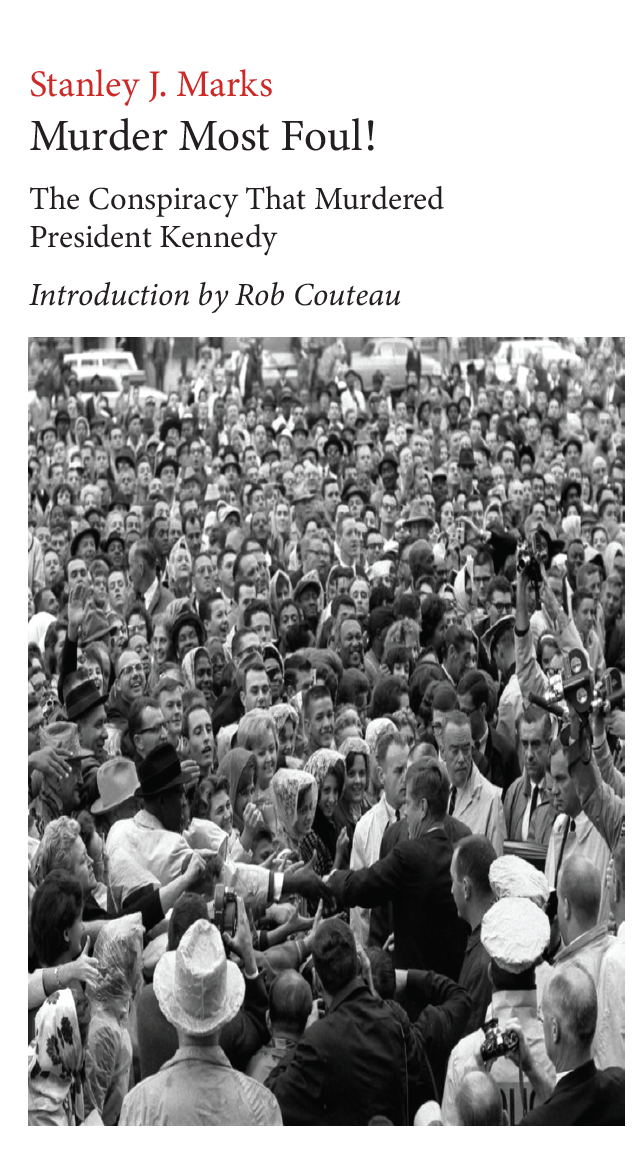
PURCHASE
INFO
Stanley
J. Marks' MURDER MOST FOUL! is
now back in print for the first
time since September 1967.
Includes Rob Couteau's
biographical essay on the
blacklisted author's
groundbreaking work and how it
may have influenced Bob Dylan's
JFK ballad of the same name.
JFK
scholar Jim DiEugenio writes:
"Couteau's
work is important, first-rate,
and a wonderful homage to one of
the most important critics of
the Warren Report ever ... and
an unsung hero in the JFK case.
Stanley Marks was rocket miles
ahead of everyone. He really
understood the big picture
early. And not just on the JFK
case." DiEugenio is the foremost
scholar on the Kennedy
assassination, author of Destiny
Betrayed: JFK, Cuba, and the
Garrison Case, and
scriptwriter for Oliver Stone's
documentary, JFK Revisited:
Through the Looking Glass
(2021). 400 pages, with
illustrations.
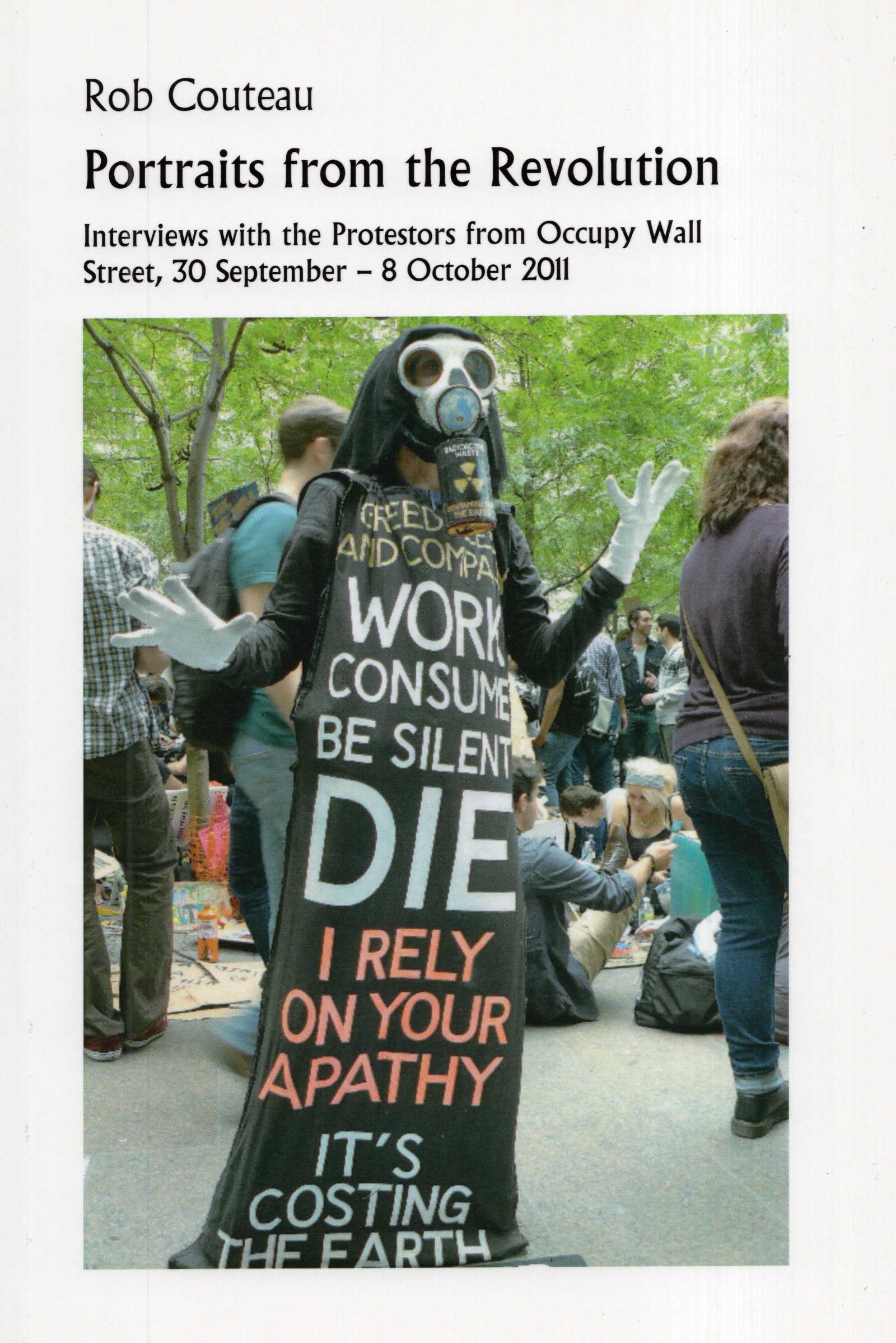
PURCHASE
INFO
"Chapters
explore not just each
individual's actions, but their
backgrounds, reasons for
participating in Occupy Wall
Street, and their experiences,
and offers criticism of media
reporting of the movement's
history, intentions, and
approaches. From how
participants decided to react to
violent antagonism against the
Occupy movement to the social
and political ramifications of
not just Occupy but the elements
it opposed, these interviews
capture participants from all
walks of life, from teens to
full-time workers, and turns the
newspaper reports into a series
of personal vignettes about
Occupy's deeper meaning."
-
Diane Donovan, Midwest Book
Review.
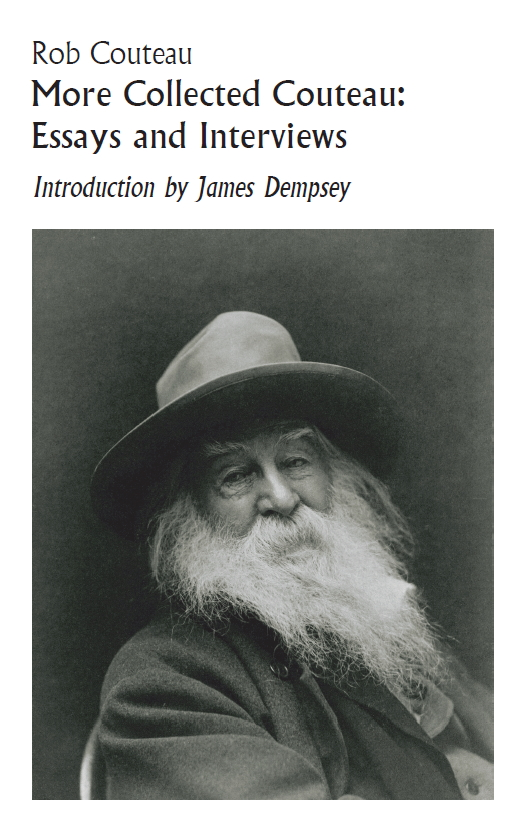
"Couteau's
essays are informal, fervent,
and well-versed examinations of
the work or author at hand. At
their best, they include
fascinating insights into the
significance of a writer like
Hubert Selby.... The interviews
are uniformly strong and include
conversations with Michael Korda
on T.E. Lawrence, Justin Kaplan
on Walt Whitman, and Robert
Roper on Vladimir Nabokov. Not
all of them focus on literature:
author Jeffrey Jackson covers
the 1910 flood of Paris and why
it's relatively forgotten; and
Robert De Sena, in one of the
best interviews, discusses his
life as a gang member turned
community activist. Couteau's
passion and wealth of knowledge
are obvious throughout the book
... and should appeal to many
readers."
- Publishers Weekly Select.
"The 'Renaissance Man' is a
multi-faceted individual whose
fingers are in just about every
pie you could imagine, fostering
a variety of abilities and
mastering many quite well. His
expertise is wide-ranging and
there's seemingly no limit to
his subject, as is demonstrated
in More Collected Couteau:
Essays and Interviews,
which gathers Couteau's insights
and encounters with a diverse
range of individuals... The joy
of reading Couteau lies as much
in his penetrating, crystalline
language as it does in the works
or figures being examined, and
so readers receive a
wide-ranging treat that examines
victims, vengeance, mortality
and immortality through an
inspection process that educates
even those unfamiliar with the
subject.... After proving his
prowess at the essay form, he
turns to the heart of the
collection: its interviews.
These range from discussions
with Albert Hoffman (activist
and the discoverer of LSD) to
interviews with literary figures
such as historian and cultural
commentator Robert Roper or poet
Christopher Sawyer-Lauçanno. One
of the pleasures in this
collection is that readers
needn't have prior familiarity
with the writers' works. Couteau
provides that familiarity by the
structure of his interview
questions, which probe the
foundation beliefs of each
figure.... From the possibility
that Nabokov suffered
unconscious doubts about his own
value that led him to insist
that the world acknowledge him
as a genius to the underlying
patriotism of counterculture
icons who were commonly seen as
rebels ... both essays and
interviews are designed to make
readers think about underlying
psychology, social perceptions,
and cultural change. Readers
seeking not just a literary
presentation but a lively
analysis of selected wordsmiths
and their lives and influences
must add More Collected
Couteau to their reading
lists. It's a powerful
presentation that offers much
insight and food for thought,
and which should find its way
into many a college classroom as
well.
- Diane Donovan, Midwest
Book Review.
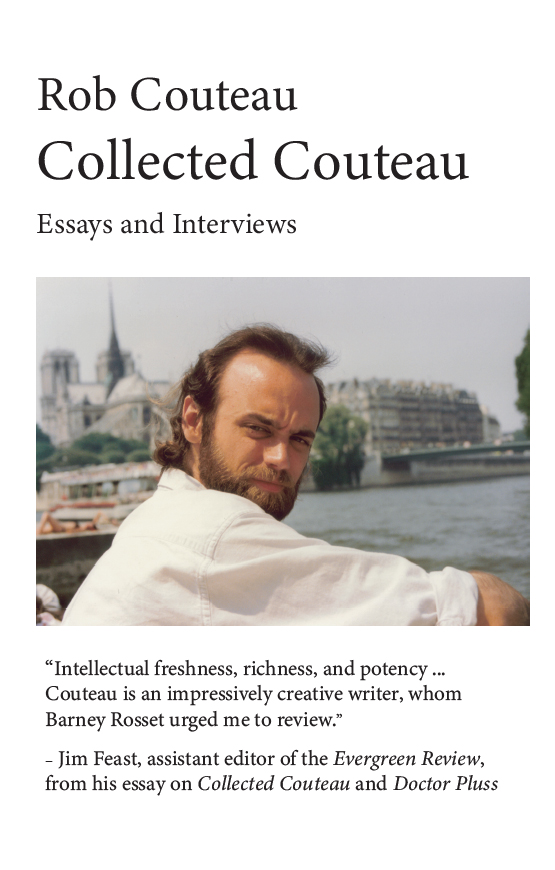
PURCHASE
INFO
Collected
Couteau features an
anthology the author's early
writings and publications. It
contains the only complete,
unabridged versions of
interviews with Ray Bradbury and
Last Exit to Brooklyn
author Hubert Selby. The
188-page trade-sized paperback
also features an unabridged
interview with Paul Bowles'
biographer Christopher
Sawyer-Lauçanno, in which the
author discusses Paul Bowles,
Allen Ginsberg, William
Burroughs, Louis-Ferdinand
Céline, and the Beats. The
collection includes an essay on
Walt Whitman and numerous book
reviews, including essays on Tea
in the Harem, by Mehdi
Charef; The Demon and
The Room, by Hubert
Selby; Libra, by Don
DeLillo; Love in the Time
of Cholera, by Gabriel
Garcia Marquez; The
Mustache, by Emmanuel
Carrère; A Literate
Passion: The Letters of Anais
Nin and Henry Miller, and
a review of Allen Ginsberg's
1990 photography show in Paris.
It also contains an in-depth
review of Carl Jung:
Wounded Healer of the Soul,
by Claire Dunne; and Jung,
My Mother and I. The Analytic
Diaries of Catherine Rush
Cabot, by Jane Cabot
Reid.
"Intellectual freshness,
richness, and potency ...
Couteau is an impressively
creative writer, whom Barney
Rosset urged me to review." -
Jim Feast, assistant editor of
the Evergreen Review,
from his essay on Collected
Couteau and Doctor
Pluss.
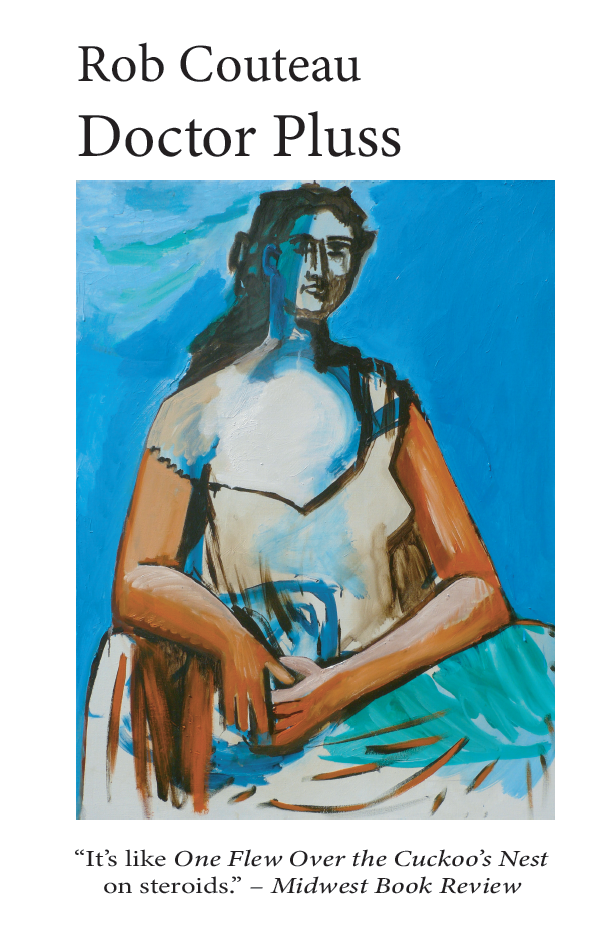
PURCHASE
INFO
"Doctor
Pluss is exceptionally
well developed and emotionally
compelling, connecting
metaphorical description with
experiences that often challenge
the traditional roles of doctor
and patient, linking them in
unexpected ways ... Couteau is
not afraid to push the literary
boundaries of convention in
pursuit of a different form of
descriptive truth, bringing
readers along in a rollicking
ride through schizophrenic
experience that ultimately
questions the foundations of
reality and perception from both
sides of the therapist's couch
... His interpretations and
descriptions of the
schizophrenic experience are
particularly astute,
astonishing, and evocatively
described ... Readers who choose
Doctor Pluss are in for a
treat. It's like One Flew
Over the Cuckoo's Nest on
steroids: a thought-provoking
examination of sanity, insanity,
and the crossover process that
leaves readers thinking long
after this therapeutic slice of
life is consumed."
- Diane Donovan, Midwest
Book Review.
"Amazingly beautiful, haunting
prose. It's a great book."
- Christopher Sawyer-Lauçanno,
author of The Continual
Pilgrimage: American Writers
in Paris (City Lights) and
An Invisible Spectator: A
Biography of Paul Bowles
(Grove Press).
"Intellectual freshness,
richness, and potency ...
Couteau is an impressively
creative writer, whom Barney
Rosset urged me to review."
- Jim Feast, assistant editor of
the Evergreen Review,
from his essay on Collected
Couteau and Doctor
Pluss.
|